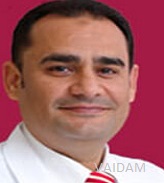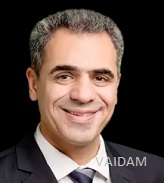Prostate cancer is a form of cancer that occurs in prostate gland cells, which is found only in males.
It is recommended in patients where cancer is not metastasized.
The most common procedure is a Radical Prostatectomy. It can be performed as open or robot-assisted laparoscopic surgery.
In Laparoscopic Prostatectomy, the surgeon makes several small incisions instead of one big incision and uses a particular long surgical instrument to remove the prostate, whereas, in open surgery, the surgeon makes incisions in the lower abdomen.
If there is a reasonable chance cancer might have spread to nearby lymph nodes, the surgeon may also remove some of these lymph nodes at this time.
The nodes are sent to the lab to see if they have cancer cells. If cancer cells are found in any nodes, the surgeon might not continue the surgery. This is because it's doubtful that cancer can be cured with surgery, and removing the prostate could lead to serious side effects.
The cost of Prostate Cancer includes:
Preoperative diagnostic tests cost may include digital rectal exam (DRE), prostate-specific antigen (PSA) test, and imaging tests such as X-ray, CT, and MRI
Surgery cost (Depends upon the type and size of the tumor and the extent to which the tumor has spread)
Type of Surgery [Radical Prostatectomy or Laparoscopic Prostatectomy]
Post-Operative cost (there might be a need for Chemotherapy or Radiotherapy before or post-surgery)
Medicines
Patient's hospital stay
The overall cost of the procedure also varies based on the patient's condition and preferences. Some of these factors are:
Type of hospital and room opted (General, Twin sharing, or Single room)
The stage and type of cancer
Patients may require repeated investigation through PET CT and related tests Post-surgery / Chemotherapy / Radiation Therapy
Any additional tests may be required, such as ECG or blood tests
An extended stay at the Hospital (Generally, the stay is around 1-2 days)
Cost of accommodation during follow-ups, in case the patient is not a local resident [may take longer duration in case of chemotherapy or radiotherapy sessions]
A digital rectal exam (DRE) can help detect abnormalities in the shape, texture, or size of the gland. A prostate-specific antigen (PSA) test is also done to find prostate infection, enlargement, inflammation, or cancer. Other than this, imaging tests such as X-ray, CT, MRI, and PET help understand if cancer has spread. The package typically doesn’t include the cost of these tests.
Alprostadil is one medication used for treating prostate cancer. You may also receive IV pain medications prescribed by your doctor to help alleviate pain at home.These medicines are not covered in the package price.
You need to take the medicines prescribed by your doctor in case you experience pain. It is crucial to let your doctor know if your pain worsens or doesn’t improve with the medication and treatment plan given to you. The medicines are not covered in the package and you must pay additionally for anything bought outside the hospital.
Listing popular specialists:

Consultant, 29 years of experience

General urology Neurourology Chronic pelvic pain Neuromodulation Urinary incontinence Urodynamics Pelvic floor care Recurrent urinary tract infections Infertility Erectile dysfunctions

Dr. Hamdy Abdel Mawla Aboutaleb
Principal Consultant, 21 years of experience

Laparoscopic Surgery Endourological Surgery

Principal Consultant, 19 years of experience

Percutaneous Nephrolithotomy (PCNL) Ureteroscopy

Senior Consultant, 25 years of experience

Male impotence Uro-oncology

Senior Consultant, 29 years of experience

Laser lithotripsy Endoscopic treatment of kidney, ureter, and bladder stones

Principal Consultant, 31 years of experience

Lower urinary tract endoscopic procedures

Senior Consultant, 27 years of experience

Urinary stones Male and female sexual functions Scrotal disease

Principal Consultant, 40 years of experience

Urethral strictures Prostatic disease Bladder tumour

Consultant, 25 years of experience

Endoscopic urological procedures and open urological surgery, Extra corporeal shockwave lithotripsy of different types of urinary tract stones, Management of Erectile dysfunction and Male infertility

Consultant, 17 years of experience

Endoscopic management of urological conditions Overactive bladder Urinary infections Interstitial cystitis Prostatitis Haematuria Urodynamics Inguinoscrotal procedures

Consultant, 20 years of experience

Overactive bladder Urinary Incontinence (males & Females) Urinary infections Interstitial cystitis Prostatitis Bladder issues after neurological diseases Bladder problems after spinal cord injury Haematuria General urological conditions

Consultant, 15 years of experience

Bladder Cancer, Prostate Cancer, Benign Prostatic Hyperplasia, Male Sterilization or Contraception.

Consultant, 15 years of experience

Urethroplasty, Pyeloplasty, Hypospadias Repair, Retrograde Intrarenal Surgery.

HOD, 20 years of experience

Urinary endoscopy surgeries, Urinary reconstructive surgeries, Laparascopic pyeloplasty, Laparascopic ureteroureterostomy and Laparascopic nephrectomy.

HOD, 20 years of experience

Andrology, Laparoscopic Surgery, Infertility, Vasectomy, Cystoscopy.

Senior Consultant, 20 years of experience

Laser Prostatectomy, Laparoscopic Uro Oncology, Female Urology, Endoscopic Stone Surgery, Kidney Transplantation.

Dr. Alejandro Manuel Egea Alfonzo
Senior Consultant, 18 years of experience

Endoscopic surgery, Urinary tract stone diseases, Prostate cancer, Minimally invasive surgery.

Consultant, 11 years of experience

Natural orifice transluminal endoscopic surgeries, Microscopic varicocelectomy, Minimally invasive surgical procedures for urinary stones, Sexual dysfunction, Male infertility

Consultant, 41 years of experience

Peyronie’s disease, Penile reconstruction, Erectile dysfunction

Consultant, 26 years of experience

Penile curvature surgery, Microscopic varicocelectomy, Genital esthetics, Transobturator and transvaginal tape surgery, Sacral nerve stimulator placement, Bladder botulinum toxin injection, Prostate cancer surgery, Genital wart excision
Radical prostatectomy's primary possible side effects are urinary incontinence and erectile dysfunction.
These side effects can also occur with other forms of prostate cancer treatment.
Our Services for Prostate Cancer Surgery in United Arab Emirates
Transparent - Professional - Without Hassles






NABH Certified Healthcare Discovery Platform
Vaidam is NABH certified healthcare discovery platform that will connect you to top-notch medical experts, hospitals, wellness options, and trusted travel partners to help identify and make the right healthcare choices.

Researched & Personalized Treatment Plan - Under One Roof
You can search for the best hospitals, read about them, view photographs of the facilities at the hospitals and the places at which the hospitals are located, and check the cost of treatment.

Quality Treatment Within Your Budget
As soon as you post an enquiry, the patient relation team will collect details from you, share them with the doctors and hospitals on Vaidam's panel, and get a personalized treatment plan. We research to get quality treatment within your budget.

Treatment to Travel
Vaidam concierge assists patients, to get medical Visa, the best airline fares and arrangements for your stay. Our concierge also helps you with daily travel, language, and food concerns. Vaidam does everything to be your perfect host. All of Vaidam’s services are free of cost to patients.

International Reach
Vaidam Health has network in 15+ countries, which includes India, Turkey, UAE, Germany, South Korea, Thailand, Malaysia, Spain.
Note: Vaidam Health does not provide medical advice, diagnosis or treatment. The services and information offered on www.vaidam.com are intended solely for informational purposes and cannot replace the professional consultation or treatment by a physician. Vaidam Health discourages copying, cloning of its webpages and its content and it will follow the legal procedures to protect its intellectual property